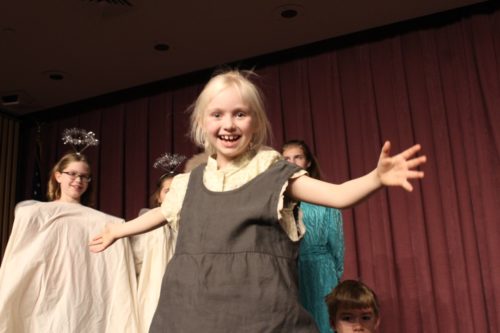Has your child dreamed of treading the boards? Maybe he saw one of the recent productions of Charlie Brown Christmas and wished to be part of the fun, or maybe she has aspirations to be the next Zendaya. Luckily, the Iowa City area has plenty of opportunities for young actors to learn the craft.
The next opportunity for young actors is the Young Footliters’ Theater Group production of Winnie the Pooh. This play will feature actors in Kindergarten through 5th grade. Auditions are January 19, 4-6 p.m., and January 20, 9 a.m.-4 p.m.

A young actor with no theater experience (or that young actor’s parent) may feel intimidated by the process of trying out for a play. Don’t fear! The directors in our area are friendly, helpful people who want your child to have a good time getting involved with theater.
Here are a few things you should know about helping your child audition for a play.
Monologue
Have your child memorize a monologue. A monologue is a short piece that shows what the actor can do with memorization and understanding of a script. Monologues can be found at websites like this. Excerpts from books or poems are also popular choices. Please make sure your child understands what he or she is saying. Shel Silverstein, for instance, is only funny if the kid is in on the joke.
Matt Falduto, who most recently directed Charlotte’s Web, says this about auditioning: “I like to have kids do short monologues, too, because some might not be great readers, but a memorized monologue gives them a chance to show what they can do. For the monologue, they need to understand what they’re saying and understand what the dramatic moments are and how to convey those.”

Cold Reading
Understand, and tell your child, that he or she may also be asked to do a “cold reading.” This is when the child is given a piece of dialogue, usually from the script. This piece from the script is called a “side.”
Evan Hilsabeck, who most recently directed What Could Go Wrong the Night Before Christmas? has this to say about cold readings: “Auditioning is a skill–help your kid practice. No one is born a great auditionee; it’s a learned skill. Almost all children’s auditions include a cold read (reading from a script the child has never seen before). It’s an easy way to help your kid practice. Give them bits of a book to read with confidence and a good strong sound in the living room. A kid who looks confident and can be loud is more than halfway to a successful audition.”
Be Open to Direction
Know that one of the main things many directors are looking for is someone who can take direction. The actor may have memorized her audition piece in one way, and she knows exactly the rhythm and the cadence of it, and where she is supposed to stand. The director may suggest that she deliver the lines in a completely different way. What if the Shel Silverstein poem is sad? What if Junie B Jones were being chased by a wolf? Let your kids know that flexibility is an asset as an auditioner.
Tara Acton, director for the upcoming Winnie the Pooh: “One of the main things I do in an audition is see how well they take direction. I’ll ask them to take the scene in a different direction, with emotion, movement, volume, etc. I really like being able to gauge their adaptability when the situation calls for it. Ability to take direction is always something I make notes on, especially if I’m not quite sure where I see the actor fitting in.”
The Story is the Goal
Please remember that it isn’t a contest, or competition. The director is not only looking for the right actor for each role; he is looking for the right actor to be part of an ensemble.
Evan Hilsabeck: “This isn’t baseball auditions. We’re not putting together a team of the “best” individual actors. We’re trying to tell a story, and we need kids who can become the characters from that story. Training, skill, and experience matter, but so do gender, height, age, look, and personality. Most of this is beyond your kid’s control, and we know that. Not being cast isn’t a sign of failure; it just means you weren’t the director’s match for this story. Keep auditioning, keep taking classes, keep at it.”

Focus and Confidence
Matt Falduto: “Here are other little things. For instance, if they’re talking while other kids are auditioning, that is something that makes me less likely to cast an actor. Finally, I really want to cast actors who are confident. Even if they’re nervous, they need to project confidence–that may mean acting before they even do their audition!”
Availability
Directors consider many factors when casting a play. When given a choice between two actors, the role may go to the person who is more available. A child who has a conflict three nights out of seven is less likely to be cast than a child who is able to come to every rehearsal. This doesn’t mean that dance class, Tae Kwon Do, singing lessons, and volleyball practice must cease during the rehearsal period, but please communicate to the director which conflicts could be rescheduled for the duration, which is usually about six weeks.
For instance, “Lulubelle has volleyball practice on Monday nights until 6:30, but will be available after that.” Or “McGregory will need to miss Tuesday nights due to his fencing class, however, he understands that his presence will be required for tech week.” “Tech week” is the week before a show opens, and involves getting actors into costumes, setting the light design, working with the actual set, and inserting sound. It’s vital that all hands be on deck during this week, and most directors will make attendance mandatory for every day of tech week rehearsal.
Follow the Child
One final thought about auditioning for the play, from me, who most recently directed the Young Footliter’s production of The Best Christmas Pageant Ever. Make sure your child is the one who is interested in being on stage. I like to ask, when I audition kids, why it is they want to be in a play. I love their answers, which include many variations on, “I’ve always wanted to perform!” or “It’s so great to get involved and meet new friends.” The kid who says, “I don’t know, my mom just signed me up,” is not as likely to get a part as the kid who tells me, “I feel like I have always had theater inside of me.”

Best of luck to your child as they audition. And may they get a chance to, as the actors say, break a leg!










